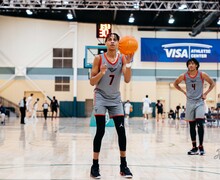Tennessee star Stokes transfers chess skills to hardwood
Courtesy of Tennessee Athletics/UTsports.com
After playing chess until high school, Tennessee forward Jarnell Stokes has rediscovered his love for the game. Playing regularly, he has seen his chess talents translate to the basketball court.
Every other week, Jarnell Stokes heads to the Wendy’s down the road from the University of Tennessee campus.
When he gets there, he walks past the counter and to the back where a group of older men huddle around chessboards. Stokes is 6-feet-8, 260 pounds and wears a size 20 shoe. He doesn’t look like the rest of the group, but they recognize him right away.
“They all watch Tennessee basketball and keep up with it,” Stokes said, “and they know me `cause I’m always coming.”
When Stokes — now a junior forward for the Volunteers — first started at Tennessee in the fall of 2011, he went to Wendy’s to burnish his chess skills. But what was at first an outlet from the life of a Division I basketball player now transcends a recreational release.
Stokes’ chess game is his basketball game. It helps him see things before others on the court, and shapes his preparation off of it.
“He’s done his best job this year in our program of preparing for games. Making decisions, taking care of the basketball and reading defenses a lot better,” Tennessee head coach Cuonzo Martin said. “You have to give credit to his chess game.”
When Daniel Lucas plays doubles tennis, his teammates tell him he plays like a chess player. Lucas is the director of publications for the United States Chess Federation and editor of Chess Life magazine. The game has helped him on the tennis court and as an avid runner.
According to Lucas, for an athlete like Stokes playing chess breeds a competitive and intellectual advantage. “Study after study shows that chess playing keeps people cognitively sharp,” Lucas said. “It is easy to see that this skill is translatable to the basketball floor.”
When Stokes was in kindergarten, his parents started him in a chess club. He fell in love with the game and played regularly until high school and travel basketball teams became too demanding and it was pushed aside.
But in his freshman year at Tennessee, he rekindled his lifelong hobby.
“I first went to Wendy’s just to see if I had it like I used to,” Stokes said. “But now I can beat almost all of them and it’s helping me out on the court. I like that it tests my brain and is also a release from basketball.”
In 2011, Stokes was a highly touted recruit out of Memphis, Tenn., with no college pedigree. He averaged 9.6 points and 7.4 rebounds as a freshman and was elected to the Southeast Conference’s all-freshman team at season’s end. As a sophomore he averaged close to a double-double with 12.4 and 9.6, fast tracking himself onto opponents’ scouting reports.
Now he’s posting 13.4 and 9.3 and deliberately plans for each game.
“If you would have said scouting reports last year, I wouldn’t have believed it,” Stokes said. “But now I pretty much just like to vision the game before it happens, and try and prepare myself for anything that happens.”
This past summer Stokes went to the drawing board. During his breakout sophomore season teams started to completely take away his left hand. They also started to double-team him whenever he caught the ball in the post.
So he worked day after day on developing his left-handed hook shot in the offseason. Then after workouts he sat in the film room and looked at tape of teams doubling him to see where his teammates would float to on the court.
By combining his physical and cerebral selves, Stokes has made himself a dominant forward that Martin says “could be one of the best college basketball players in the country.”
All because when other players finish working out and turn in for the day, Stokes sits down and polishes his game by playing another.
“Dealing with double teams, I feel like having chess really helps,” he said. “Me being able to keep my focus and not panic in certain situations and my whole demeanor can be a result from chess. I can really deal with double teams and see plays in advance.
“It’s all chess.”
Published on January 15, 2014 at 1:50 am
Contact Jesse: jcdoug01@syr.edu | @dougherty_jesse





